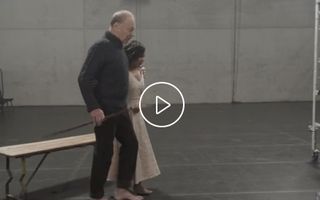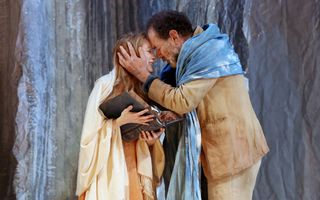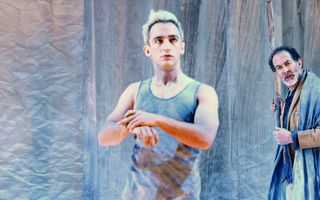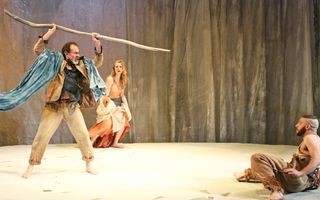 Watch
Watch
Music and Magic
The Tempest is a soundscape of noises, magic, spells and “strange and solemn music” (Act 3, Scene 3). Caliban says the island is “full of noises” (Act 3, Scene 2), and many characters are entranced or led by music or Ariel’s music and singing: “Where should this music be? I'the air or the earth?” (Act 1, Scene 2) Both music and magic represent something otherworldly, strange and undefinable. They are devices to transport the audience, and guide, lead, confuse and manipulate those lost on the island. Music is said to have “prick'd their ears, / Advanced their eyelids, lifted up their noses” (Act 4, Scene 1), and Ariel’s magic on the ship has “flamed amazement” (Act 1, Scene 2).
Magic brings a pagan theatricality to the play in which whole pageants, banquets, nymphs, spirits and goddesses can arrive and disappear at any given moment: “Thunder and lightning. Enter Ariel, like a harpy, claps his wings upon the table, and, with a quaint device, the banquet vanishes” (Stage directions, Act 3, Scene 3).
Magic also allows Prospero to be omniscient; in a sense it gives him divine powers to punish and to protect: “My master through his art foresees the danger / That you, his friend, are in, and sends me forth” (Act 2, Scene 1). In the final act Prospero reflects on the sheer magnitude of his magic: “I have bedimmed / The noontide sun, called forth the mutinous winds, / And 'twixt the green sea and the azured vault / Set roaring war” (Act 5, Scene 1), and in doing so renounces it, “But this rough magic / I here abjure” (Act 5, Scene 1).
The Tempest
Although the opening tempest or storm has literal effects on the narrative, many theorists see it as something more symbolic. Many argue that the tempest itself is more of a figurative storm or rage that exists within Prospero. It is the manifestation of his need for revenge, something that has plagued him for 12 years. What he does over the course of the play is learn to calm the ‘tempest’ within himself, thus shifting the story from a revenge tragedy into one of redemption and forgiveness. Prospero says, 'I'll deliver all; / And promise you calm seas, auspicious gales' (Act 5, Scene 1).
Prospero’s Books
Prospero’s books are a symbol of his knowledge and power and one of the only civilized items he takes from the court to the colony. Caliban learns there is power in such knowledge and advises Trinculo and Stephano to “Remember first to possess his books… for without them he’s but a sot” (Act 3, Scene 2). They are conversely a symbol of Prospero’s demise and self-indulgence: they drew him from his duties as Duke and allowed his brother Antonio to usurp him. In his initial retelling of events to Miranda in Act 1, Scene 2, Prospero admits that he neglected “worldly ends” and was “all dedicated to closeness and the bettering of my mind”. At the end of the play Prospero realises the negative part his books played in his downfall and the positive part they played in assisting his revenge, but knows that he must ultimately let them go:I'll break my staff,
Bury it certain fathoms in the earth,
And deeper than did ever plummet sound
I'll drown my book.
Act 5, Scene 1
Water
Water in this play is the great leveler. It is unpredictable, it surrounds, it can drown, it withdraws people from their familiar surroundings and it can overpower any man, no matter their status. As the Boatswain says to the Lords, “What cares these roarers for the name of King?” (Act 1, Scene 1) Water also brings fear and pain. As the ship is sinking at the end of the first scene, Gonzalo begs to be free of the unpredictability of water and return to what he knows: “Now would I give a thousand furlongs of sea for an acre of barren ground”. (Act 1, Scene 1).
Alonso weeps that his son is drowned and similarly Ferdinand is informed by Ariel that this “sea-change” has killed his father: “Nothing of him that doth fade / But doth suffer a sea-change / Into something rich and strange” (Act 1, Scene 2). Witness to the tempest, Miranda fears for the sailors lost in the “wild waters” (Act 1, Scene 2), and when Ariel chides the nobles in Act 3, Scene 3, he reminds them of the fearful waters that they exposed Prospero and baby Miranda to, all those years ago: “Exposed unto the sea, which hath requit it, / Him and his innocent child”. Here Shakespeare introduces a kind of natural karma or cyclical relationship with nature as Ariel informs them that the sea now repays them for their foul deeds: “The powers, delaying, not forgetting have / Incensed the seas and shores” (Act 3, Scene 3).
Chess
The chess game between Miranda and Ferdinand is revealed at the exact moment when Prospero’s plan, or ‘chess game’, has fallen into place, and just like the game, he has captured the King. Alonso discovers his son Ferdinand is alive, and finds he is promised to Prospero’s daughter without his consent. The chess game works as a device to highlight this political manoeuvre.






